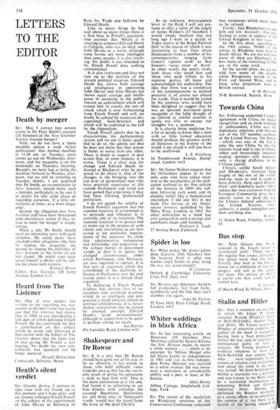Shakespeare and Dr Rowse
Sir: It is a pity that Dr Rowse should have gone out of his way to be so offensive in his article to those who hold different views from his own as this has the inevit- able result of giving his opponents a stick to beat him with. This is the more unfortunate as I, for one, had found it so refreshing to see him dismiss with contempt the assorted Baconians, Marlovians etc. (all those who, in Tennyson's words, 'would tear the laurel from the brow of the dead Christ').
As an ordinary, non-academic lover of the Bard, I will not pre- sume to offer a letter of the length of James Walker's (17 October). I would simply mention that not long ago I went to a recital of Tudor poetry at the Royal Festival Hall in the course of which it was fascinating to hear lines about Shakespeare from a number of his contemporaries, ranging from Green's 'upstart crow' to Ben Jonson's 'sweet swan of Avon'. In other words, the poet's rivals, both those who hated him and those who paid tribute to his supreme genius, all knew and acknowledged his authorship. The idea that there was a conspiracy of his contemporaries to mislead posterity is of course too absurd for words. That it would be joined by his enemies, who would have been delighted to suggest that he was an ignorant provincial quite incapable of the lofty' thought of an Oxford or similar courtier is surely too silly to occupy our thoughts for a moment. It is clearly bitter medicine for a lot of people to know that a man with so little formal education should produce the greatest works of literature in the history of the world. I am afraid it will just have to be swallowed.
L. E. Weidberg 14 Templewood Avenue, Hamp- stead, London Nw3 Sir: Mr James Walker suggests that the Oxfordians appear to be the only ones who have called atten- tion to the peculiarities of the dedi- cation prefixed to the first edition of the Sonnets in 1609—the full- stop following each word, and its shaping rather like a monumental inscription. I did just this in my book The Secrets of the Shake- speare Sonnets, published by the Mitre Press. London, in 1965. No other dedication to a book has ever appeared in such a strange and significant shape and wording.
Roderick L. Eagle 27 Avenue Road, Falmouth










































 Previous page
Previous page